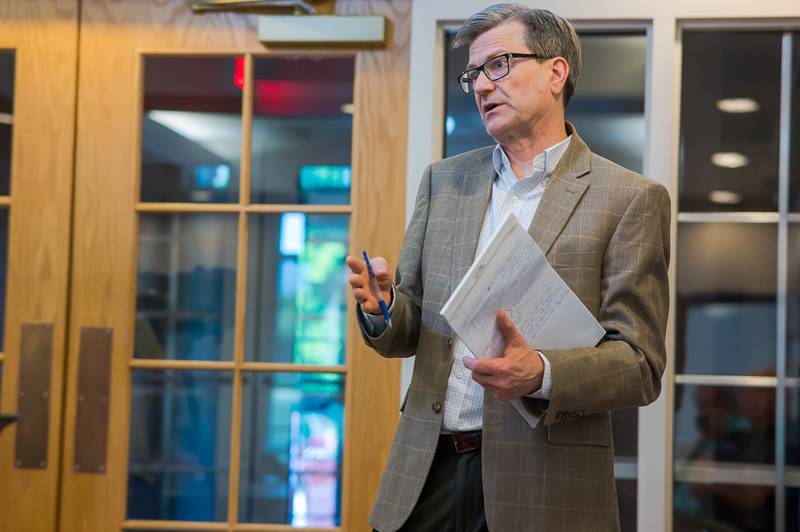
Photo by Howard Owens.
A major telecommunications company's application to erect a new mobile device cell tower is a fairly straightforward approval process for local planners, and on Tuesday evening, Robert W. Burgdorf of Rochester, an attorney representing Verizon, provided several useful nuggets of information.
It was an initial meeting in the regulatory process with the Town of Batavia Planning Board. The application must still undergo an environmental review and a public hearing, but Burgdorf was happy to discuss the process and some of the technical issues involved in installing a cell tower.
Cell towers are extremely location-sensitive because they have to be high enough to reach the neighboring towers but not so high that there is a spillover of signals into the neighboring cells.
"They've got to be placed so that they can hand off to the neighboring cells, again without interfering," Burgdorf said.
They wind up in a honeycomb-like grid, not too close but not too far apart.
Cell towers generally serve a one or two-mile area and can't be too close together or too far apart.
If the tower is under 200 feet tall—this one will be 154 feet tall—the Federal Aviation Administration does not require lighting or striping.
This down will be a matted steel gray.
"We've learned, and we've actually done studies, that this blends in with our skies in Western New York," he said.
An observation a couple of board members quipped was a depressing thought.
Oh, and 5G doesn't cause COVID.
A board member's question prompted the discussion of health concerns about cell towers. Burgdorf said federal law preempts that as a concern for local planners, which he regrets because it also preempts an opportunity to educate the public.
"This is a radio signal, that's all this is," he said. "It is an incredibly weak radio signal. We've had radio signals around since the 20s, the 30s. The only difference between this and a television or radio station is that those operated tens of thousands of watts, sometimes megawatts. So the power levels, from radio and television, just radio signal is much, much stronger than these. These are incredibly weak. They have to be incredibly weak for two reasons. One is they can't interfere with neighboring cells, which are often a mile, two miles away, and we have to be able to get a return path from the user"
He said that if anybody is concerned about cell phone signals, the first thing they should do is seek to do is shut down radio and television signals.
"The issue does come up, but anybody who looks into it, who's being rational, will see that that's not really an issue," Burgdorf said.
The tower will be located at 9300 Wilkinson Road on a 100x100-foot leased parcel. It will be fenced, and a small gravel road will connect it to Wilkinson. There will be minimal traffic to the location—maybe one maintenance worker a month will visit the site.
The board voted to seek lead agency for coordination purposes under the state's SEQR regulations (pronounced seek-ur, it stands for State Environmental Quality Review Act) even though Burgdorf informed lead agency designation for this project is not strictly required.
The board did it as a matter of course, because that is its standard practice, but board members said they will seek their attorney's opinion.
"It's not a fatal error to declare yourself lead agency," Burgdorf said, so he didn't object.
He said a lead agency is only required when there are other "involved" agencies. In this case, other agencies, such as the Genesee County Planning Board, are only "interested" agencies, so there is nothing in the SEQR process to coordinate with other involved agencies.
"Look, the SEQR regs are a pain. They really are," he said. "They're pretty convoluted and they force a lot of municipalities to really become an expert. It is a pretty intense set of regulations, so for what it's worth, if you declare yourself lead agency, that's not the process, but it doesn't make it defective, so whatever you want to do."
